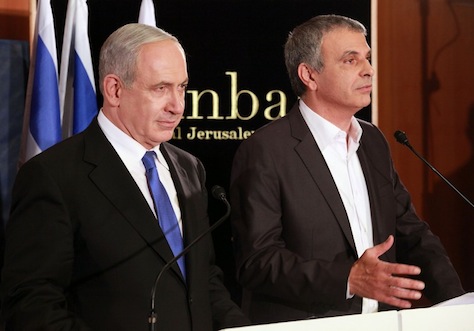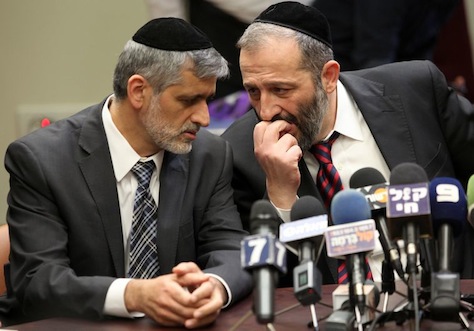
Continue reading Netanyahu bolsters governing coalition at cost of alienating Ya’alon

Continue reading Netanyahu bolsters governing coalition at cost of alienating Ya’alon
 Photo credit to Marc Israel Sellem / Jerusalem Post.
Photo credit to Marc Israel Sellem / Jerusalem Post.
After Israeli president Reuven Rivlin finished talks with all of the country’s parliamentary parties on Monday, Israeli prime minister Benjamin Netanyahu was set to amass a governing majority in a six-party coalition that will easily prove more right-wing than either of Netanyahu’s governments following the 2009 and 2013 elections.![]()
While coalition talks are not likely to begin until Wednesday, when Rivlin formally asks Netanyahu to begin negotiations, the contours for the next government seem clear.
* * * * *
RELATED: Eight things we know after Tuesday’s Israeli election results
* * * * *
It’s worth taking a moment to state just how right-wing the ‘Netanyahu IV’ government will be.
In 2009, when Netanyahu returned to the premiership after a decade-long stint in the wilderness, his coalition included a former center-left prime minister, Ehud Barak, and the other traditional Israeli party, the Labor Party (מפלגת העבודה הישראלית).
In 2013, after a long round of negotiation talks, Netanyahu ditched the ultraorthodox haredi parties in favor of two moderates — Tzipi Livni, a centrist and former foreign minister and Yair Lapid, the leader of the secular centrist Yesh Atid (יש עתיד). Lapid, who would serve for two years as finance minister, demanded that Netanyahu eschew the haredi parties, especially in light of a contentious debate about the exemption of haredim from the Israeli Defense Forces.
Today, however, Netanyahu is set not only to welcome those ultraorthodox parties back into government, but to exclude Labor, Yesh Atid and any other real centrists. For all the hand-wringing among Israeli allies, most especially the United States, over the past six years of Netanyahu’s dominance, Netanyahu’s third consecutive term will be something like ‘Netanyahu squared.’
Lapid, Livni and the Labor Party leader Isaac Herzog have all ruled out joining a Netanyahu government, to the dismay of centrists (including, allegedly, Rivlin) who would prefer a more balanced government with a ‘national unity’ flavor.
The six parties aren’t firmly set yet, but all of them, representing 67 members of Israel’s unicameral, 120-member parliament, the Knesset (הַכְּנֶסֶת), recommended Netanyahu as the new prime minister and, accordingly, all six are expected to take part in the next Netanyahu government: Continue reading Netanyahu set for six-party, right-wing coalition
No matter who wins Israel’s election tomorrow, no party is expected to win more than a fragment of the seats necessary to win a majority in Israel’s unicameral 120-member parliament, the Knesset (הַכְּנֶסֶת).![]()
That means that for days and, likely, weeks after the voting ends, Israel will be caught up in the battle to form a new governing coalition. That process will begin as soon as Tuesday, when Israel’s president Reuven Rivlin begins talking to party leaders to assess who should have the first shot at forming a coalition.
That individual, whether it is current prime minister Benjamin Netanyahu or Labor Party leader Isaac Herzog, will then have 42 days to build a government that can win at least a 61-vote majority in the Knesset.
The bottom line is that Israel and the world could be waiting a long time for a new government, though Rivlin is said to be anxious to speed the process along. That, in part, will depend on Israel’s many parties.
Rivlin, previously the speaker of the Knesset and, until his presidential election last year, a member of the center-right Likud, will have some discretion in naming a prime ministerial candidate, but it will almost certainly be the leader whose party wins the most votes in Tuesday’s election (unless a clear majority of other party leaders, over the course of presidential talks, support the second-place winner to lead the next government).
So how to keep track of the various coalition possibilities?
Suffragio‘s guide to the Israeli political parties and each party’s compatibility with every other party, as determined on a subjective scale of four degrees. Here’s what each of the colors mean: Continue reading The definitive chart to deciphering Israel’s coalition negotiations
 Photo credit to Kobi Gideon / GPO / Flash90.
Photo credit to Kobi Gideon / GPO / Flash90.
It’s still irresponsible chatter to suggest that Russian president Vladimir Putin’s nine-day absence from public view is anything more serious than the flu.![]()
![]()
![]()
But as Julia Ioffe wrote Saturday in The Washington Post, even if Putin’s absence is, as very likely, caused by something as mundane as the influenza epidemic currently sweeping through Moscow, it is becoming a more serious event because of the highly personalized system of Russian government where everything has become so micromanaged by Putin and his close allies. The longer Putin’s absence, the greater the chances of an internal coup or putsch, perhaps by the internal security forces, the siloviki, upon whose support Putin rose to power in the 2000s:
You can see why some in Russia are panicking right now—or veiling their discomfort in humor. It certainly doesn’t help that Putin’s disappearance comes at a particularly nervous time for the country. It is at war in Ukraine, its economy is shuddering under sanctions and historically low oil prices, and the opposition leader, Boris Nemtsov, was recently gunned down steps from the Kremlin. There is a sense in Moscow that the wheels are coming off. To Moscow’s chattering class, Putin’s disappearance confirms that impression.
Meanwhile, on Tuesday, in national elections, Israeli prime minister Benjamin Netanyahu’s center-right Likud (הַלִּכּוּד) is set to win fewer seats in Israel’s parliament, the Knesset (הכנסת) than the center-left Zionist Union (המחנה הציוני) of Labor Party leader Isaac Herzog and former justice minister Tzipi Livni. Though it’s too soon to write off a third consecutive mandate for Netanyahu, the March 17 vote is the toughest electoral fight for Netanyahu since he lost his first bid for reelection in 2001.
Even if Israeli president Reuven Rivlin, a former Likud speaker in the Knesset, convinces Likud and the Zionist Union to form a national unity coalition, polls show that Herzog, and not Netanyahu, would become prime minister. That would place deadening pressure on Netanyahu’s leadership of Likud, where capable replacements, such as former interior minister Gideon Sa’ar, are waiting in the wings.
Remarkably, that means that US president Barack Obama’s two most nettlesome rivals in international affairs could be sidelined in the course of the same week — or even the same day. Continue reading Obama’s top two foreign rivals could be vanquished in one week
 Photo credit to Marc Israel Sellem / The Jerusalem Post.
Photo credit to Marc Israel Sellem / The Jerusalem Post.
Since the emergence of Shas (ש״ס) in 1984, there’s hardly been a government that hasn’t included the ultraorthodox party.![]()
In 31 years, Shas has joined the opposition just twice, including a stint between 2003 and 2006. It’s been out of government since 2013, not out of its unwillingness to work with Israeli prime minister Benjamin Netanyahu, who hopes to win a third consecutive mandate on March 17, but because of opposition from Yair Lapid, who joined Netanyahu’s government as finance minister.
In the current election, however, a recent split between the two men who have led Shas for the past quarter-century now holds massive consequences for whether Netanyahu will win a fresh mandate as prime minister. The split risks not only diluting the haredi vote in the upcoming elections, but could also complicate the already difficult arithmetic for any leader to achieve a governing majority in the Knesset (הכנסת), Israel’s 120-member unicameral parliament. Ironically, the split on the ultraorthodox right comes at the same time that Israel’s Arab parties have united into a single movement.
Aryeh Dery served as Shas’s leader in the 1990s and held several top positions, including minister of internal affairs. He was convicted of bribery in 2000, however, and ultimately served 22 months in prison. Eli Yishai replaced him as Shas leader and, for the next 13 years, followed Dery’s lead of bringing Shas, more often than not, into government. Yishai (pictured above, left, with Dery, right) served as deputy prime minister under each of Ariel Sharon, Ehud Olmert and Netanyahu.
Dery’s return to politics, however, caused a personal rift between the two leaders. Dery muscled his way back to the Shas leadership in 2013, which precipitated Yishai’s decision last December to form a new party to contest the 2015 elections, Yachad (יחד). The differences between Dery’s Shas and Yishai’s Yachad are subtle. Both parties appeal to the haredi right, and both continue to draw support primarily from Sephardic Jews.
Though Shas is widely and accurately described as a party of the haredi, the ultraorthodox Jews in Israel, it is also traditionally a party that appeals chiefly to Sephardic Jews, which hold just a slight majority among Israel’s Jewish population, though the Ashkenazi Jewish population, which has roots primarily in Eastern Europe, has grown, in large part to an influx of Russian Jews after the fall of the Soviet Union. Today, however, the Sephardic label applies not only to the Sephardic tradition that developed on the Iberian peninsula, but to the wider group that includes Maghrebi Jews from north Africa and Mizrahi Jews from the Middle East.
* * * * *
RELATED: Israeli Arabs unite with fresh voice for non-Jewish voters
RELATED: Who is Isaac Herzog? A look at Israel’s opposition leader.
* * * * *
In the current campaign, Dery has emphasized social and ethnic solidarity, with slogans as blatant as ‘Mizrahi votes Mizrahi.’ Nevertheless, Yachad still appeals to core Shas voters, and Yishai has capitalized on the impression that he is the more authentic standard-bearer of the late rabbi Ovadia Yosef, who served until his death in December 2013 as Shas’s spiritual guide. Videotapes emerged late last year of Yosef critizing Dery in 2008 in very harsh terms.
But Yachad is also targeting disappointed voters of Bayit Yehudi (הבית היהודי, ‘The Jewish Home’). In joining Netanyahu’s most recent government as economy minister, its leader Naftali Bennett (himself a former chief of staff to Netanyahu) was sure to disappoint some of his most conservative supporters. But Bennett often criticized Netanyahu in the last two years for not being aggressive enough in Israel’s offensive against Gaza, his Jewish Home party sits to the right of Netanyahu’s Likud (הַלִּכּוּד) on most issues, and Bennett has been a leading proponent for Jewish settlers in the West Bank. Polls predict that his party will maintain or even improve its 11-seat caucus in the Knesset.
Yachad is angling to the right of Bennett, however, and the second member on Yachad’s party list is Yoni Chetboun, a renegade MK who found himself too far right even for Bennett’s Jewish Home. Yishai hopes to become to Bennett what Bennett has become to Netanyahu — a more credible right-wing voice. This constant race rightward among the fragmented Israeli right is one of the chief reasons that Netanyahu is now struggling to hold the premiership, and it explains why his recent speech in Washington was aimed more toward right-wing voters in Israel than to moderates or even to US politicians.
While Yishai declared his support for Netanyahu’s premiership back in December, Dery has been more coy about his intentions. In a country where post-election coalition-building has become just as important as elections themselves, promises aren’t worth much after March 17. Both parties would clamor to join a broad-based unity government that includes both Likud and the center-left Zionist Union (המחנה הציוני). Perhaps the worst-case scenario for the religious parties is a split, whereby Dery ultimately backs Herzog and Yishai backs Netanyahu. That could dilute the once-formidable leverage that the Sephardic haredi once deployed through Shas. More importantly for international affairs, that could even make it impossible for either bloc to amass a majority.
Continue reading Israel’s split haredi parties still hope to hold balance of power
 Photo credit to Atef Safadi/EFE.
Photo credit to Atef Safadi/EFE.
With just five days to go until the next Israeli general election, one party vying to win the third-largest bloc of votes, isn’t Zionist. It isn’t even necessarily Hebrew-speaking. ![]()
It’s the newly merged force of Israel’s four Arab parties, the ‘Joint List’ (القائمة المشتركة, הרשימה המשותפת). In addition to residents of the Palestinian territories, which include 2.7 million in the West Bank and 1.8 million in the more beleaguered Gaza Strip, Israel is home to an additional 1.7 million Arab citizens, nearly 20% of Israel’s total population (and expected to rise to 25% shortly), who have full citizenship rights to participate in voting, though many Israeli Arabs have described the hardships of living in an officially Jewish state in the Middle East, surrounded by a handful of often hostile Arab neighbors.
Under the leadership of Ayman Odeh (pictured above), a 41-year-old attorney from Haifa, the Joint List is emerging with surprising momentum as the Israeli campaign ends. Odeh himself is the new leader of the leader of Hadash (الجبهة or חד”ש, ‘New’), a longstanding socialist Jewish-Arab unity party with roots in the Israeli Communist Party. Odeh fell short of representing Hadash in Israel’s 120-member, unilateral coalition, the Knesset (הכנסת), after running sixth on the party’s candidate list in 2013, but could lead the Joint List to 13 seats or more after the March 17 election.
* * * * *
RELATED: Who is Isaac Herzog? A look at Israel’s opposition leader.
* * * * *
Odeh is attracting Arab voters in large numbers, and even a handful of Jewish voters, with his emphasis on leftist economic policies to address inequality and other social justice issues in Israel, stealing the thunder from political leaders like former communications minister Moshe Kahlon, who founded a new center-right party, Kulanu (כולנו, ‘All of Us’), and, until recently, finance minister Yair Lapid, who founded the centrist party Yesh Atid (יש עתיד, ‘There is a Future’).
With polls showing a tight race between prime minister Benjamin Netanyahu’s center-right Likud (הַלִּכּוּד) and the ‘Zionist Union’ between Isaac Herzog’s center-left Labor Party (מפלגת העבודה הישראלית) and former justice minister Tzipi Livni’s supporters, the Joint List is among the candidates vying for third place. That could make Odeh and the Israeli Arabs, for the first time in decades, a constituency with the power to make or break Israel’s next government.
If, as some commentators have argued, Israeli president Reuven Rivlin will call on Netanyahu and Herzog to form a unity government, that would also make Odeh’s coalition the official opposition in the world’s only Jewish state — an Arab coalition comprised of hardcore Islamists and longtime communists. That result might even legitimize Israeli democracy in the eyes of many who have become disillusioned with Israel’s decades-long occupation of the Palestinian territories. Continue reading Israeli Arabs unite with fresh voice for non-Jewish voters
As Israeli prime minister Benjamin Netanyahu travels to the United States to deliver a controversial address to the US Congress on Tuesday morning, he’ll leave behind him in Israel (if only for a couple of days) one of the toughest election campaigns of his career.![]()
The Washington speech has sucked up much of the attention from Israel’s election campaign, both in the United States and in Israel itself. But that doesn’t guarantee that Netanyahu will win what would be a fourth term as prime minister and his third consecutive term since returning to power in 2009.
Netanyahu’s center-right Likud (הַלִּכּוּד), consistently since December, has been tied in most polls with the Zionist Union (המחנה הציוני), a merger between the center-left Labor Party (מפלגת העבודה הישראלית) and a bloc of moderates led by former justice minister Tzipi Livni, herself the former leader of the late Ariel Sharon’s essentially defunct Kadima (קדימה, ‘Forward’).
Though Israeli politics has become a dizzying array of fragmented, personalized parties, where political leaders denounce opponents one day only to join forces with the same opponents the next, Herzog and Livni both support a more progression economic agenda as well as the ‘two-state’ solution to the Israeli-Palestinian conflict.
The Zionist Union’s combined support means that Labor’s newest leader, Isaac Herzog, has emerged as the top alternative to Netanyahu to become Israel’s next prime minister. A soft-spoken attorney, Herzog isn’t known for his charisma or his bluster, and his chief quality might be that he’s regarded as the quintessential anti-Netanyahu, at least in style.
So how did Herzog (pictured above) get to this point? And what would a Herzog-led government look like?
Herzog wants to end Labor’s wilderness period
Though the Labor Party hasn’t won an Israeli election since 1999, it nevertheless has a storied legacy — it’s the party of Golda Meir, of Yitzhak Rabin, of Shimon Peres. Herzog himself is the son of Israel’s sixth president, Chaim Herzog, and he studied in New York in the 1970s when his father was serving as Israel’s ambassador to the United Nations. Herzog is Labor’s fourth permanent leader in a decade, and he hopes to lead Labor to its most successful election victory since the 1999 parliamentary elections under former prime minister Ehud Barak. Continue reading Who is Isaac Herzog? A look at Israel’s opposition leader
Washington, it’s not always about you. ![]()
![]()
For a week, US House speaker John Boehner’s decision to invite Israeli prime minister Benjamin Netanyahu to address a joint session of the US Congress has stirred controversy in the capitals of both countries, but especially in Washington, where commentators of all political stripes are attacking the veteran Israeli leader for the breathtaking breach of protocol in bypassing the administration of US president Barack Obama and dealing exclusively with Obama’s political opponents in the legislative branch. The Atlantic‘s Jeffrey Goldberg, perhaps the leading US commentator on Israeli affairs and the bilateral relationship, slammed the move in a piece on Tuesday headlined, ‘The Netanyahu disaster.’
Yes, Netanyahu wants to stop Iran from becoming a nuclear power, and he’s made it clear that he will stop at nothing to thwart Tehran from enriching even the tiniest bit of uranium in its quest to develop its nuclear energy industry — to say nothing of a nuclear-armed Iran.
Yes, Netanyahu is a political foe of the Obama administration and, time after time, he’s gone out of his way to indicate his disapproval of its approach to Iran and other issues central to Israeli regional security. Netanyahu has increasingly developed common cause with the US right, and he has a fervent supporter in Sheldon Adelson, one of the wealthiest Republican donors in the United States (he almost single-handedly bankrolled former speaker Newt Gingrich’s 2012 presidential bid) and a top Netanyahu financier in his own right.
But neither of those are the real reason that Netanyahu is so eager to speak before the US Congress, now entirely controlled by the Republican Party. Nor will Netanyahu be dissuaded by arguments that it’s a fantastic breach of protocol that will make an already tense relationship with the Obama administration worse. After all, Netanyahu practically endorsed Mitt Romney, Obama’s Republican challenger for the presidency in 2012, and he easily won his own battle for a new term as Israeli prime minister two months after the American presidential election. The potential of alienating a sitting US president certainly didn’t harm Netanyahu’s own domestic political prospects two years ago. The fact that Netanyahu is one of the few US allies who so often publicly contradicts the US president might even boost his standing among Israeli voters.
The real impetus for Netanyahu?
His scheduled appearance comes just two weeks before he faces what will be his toughest election battle since 1999, when he lost an election to Ehud Barak, then the leader of the Labor Party (מפלגת העבודה הישראלית). Continue reading The real reason Netanyahu is coming to Washington
After weeks of tension, Israeli prime minister Benjamin Netanyahu sacked justice minister Tzipi Livni and finance minister Yair Lapid on Tuesday, accusing them of trying to lead a ‘putsch’ against him, and the Knesset (הכנסת), Israel’s unicameral parliament, has now voted to dissolve itself in advance of snap elections in early 2015.![]()
Just two years and two months after Israel’s last parliamentary election, Israel is set to go to the polls on March 17, two years sooner than the current parliamentary term ends. Despite Netanyahu’s bravado in triggering early elections, neither he nor Lapid nor Livni are assured of increasing their share of the vote.
While Netanyahu remains the favorite to return as prime minister as the head of his center-right Likud (הַלִּכּוּד), he will be vying to win a fourth term leading government after two of the toughest years of his political career. Though the election is likely to focus, increasingly, on domestic issues, it follows this summer’s ‘Operation Protective Edge’ against Hamas in the occupied Gaza strip that lessened global support for Israel. It also follows Arab-Jewish violence in Jerusalem in recent weeks, and after Sweden formally recognized Palestine’s sovereignty in October (as the French parliament voted on the issue earlier this week).
* * * * *
RELATED: Twelve lessons to draw from Netanyahu’s new Israeli cabinet government [March 2013]
* * * * *
Nevertheless, unless terrorism or religious violence increases, the Palestinian question will invariably fade from the agenda of the country’s leading politicians — for at least the next four months.
Accordingly, the election will be a referendum on Netanyahu’s leadership over the past two years, including the management of his coalition, the struggle of Israel’s middle class, and global matters like his handling of the Gaza war and testy relations with the United States and the Obama administration. Critics from both the left and right will target Netanyahu during the 2015 campaign. Moreover, if Netanyahu falls short next March, his position within Likud is even more tenuous after he wasted precious political capital attempting (and failing) to block former Knesset speaker Reuven Rivlin’s presidential candidacy.
With allies like these, who needs enemies?
The unwieldy coalition Netanyahu formed in 2013 has been increasingly unstable since the end of the military action in Gaza earlier this year. The causes lie not only among moderate critics to Netanyahu’s left like Livni and Lapid, but among conservative critics to his right, including his one-time chief of staff, economy minister Naftali Bennett and his nationalist foreign minister, Avigdor Lieberman. During the Gaza conflict, Netanyahu nearly fired Bennett after his strident criticism that Israel’s military action wasn’t going far enough. Continue reading Netanyahu sacks Lapid, Livni, seeks snap 2015 elections
When Gideon Sa’ar, Israel’s interior minister, and a leading figure in the governing center-right Likud (הַלִּכּוּד), announced his sudden resignation on September 17, it set the tongues of Israeli pundits wagging.![]()
Why would one of the most ambitious Likudniks leave government at a time when prime minister Benjamin Netanyahu’s politically unpopularity seems to be growing? Especially as one of the leading contenders to succeed Netanyahu as Likud’s leader.
A sex scandal was imminent, some said.
No, Sa’ar would be forming a new party with former communications minister Moshe Kahlon, others said. (Though it wasn’t the reasons for Sa’ar’s resignation, it’s not an impossibility in the future.)
But if you take Sa’ar (pictured above, left, with Netanyahu) at his word, he simply wanted to take a breather from politics and spend more time with his child David, who was born just nine months ago. He’s also admitted that a growing rift with Netanyahu, who has been in power since 2009, contributed to his decision to step back from the daily grind. Continue reading Top Netanyahu rival within Likud leaves politics… for now
Benjamin Netanyahu wasn’t running for Israel’s largely ceremonial presidency on Tuesday, but he’s emerged as the clearest loser after waging an unsuccessful campaign against the man who ultimately won, Reuven Rivlin, and he may have hastened his own political demise in the process.![]()
In some ways, Rivlin has been the frontrunner for the presidency for the past seven years, in light of his finish as runner-up to Shimon Peres in the 2007 election. Israeli presidents are elected by the Knesset (הַכְּנֶסֶת), Israel’s 120-member unicameral parliament.
Rivlin defeated Meir Sheetrit, a former Likud MK who now belongs to Hatnuah (The Movement, הַתְּנוּעָה), the party founded in November 2012 by the centrist former foreign minister Tzipi Livni. On the final ballot, Rivlin won 63 votes against 53 for Sheetrit, who emerged from among four challengers as the chief ‘anti-Rivlin’ vote, attracting support from centrist and left-leaning MKs.
* * * * *
RELATED: Peres, last lion of Israel’s ’48 generation,
weighs post-presidential role
* * * * *
Like Netanyahu, Rivlin is a member of the right-wing Likud (הַלִּיכּוּד), and he served as the Knesset’s speaker from 2003 to 2006 and again from 2009 to 2013. In that role, however, Rivlin often stood in the way of Netanyahu’s wishes in the name of defending parliamentary democracy:
The Netanyahu-Rivlin rift goes back to 2009, when the freshly victorious Netanyahu had Rivlin elected once again as Speaker of the Knesset. Rivlin, a tradionalist if there ever was one, soon proved to be much more loyal to parliament and to the letter of the law than to his own party. He stalled nearly every piece of anti-democratic legislation that came his way, deferring votes, sending bills to die in committees and even setting up committees especially to kill those bills he felt impinged on democratic rights. Along the way, he protected MK Hanin Zoabi when the Knesset tried to sanction her for taking part in the Gaza flotilla; elevated MK Ahmed Tibi, the Palestinian Israelis most love to hate, to deputy-speaker; acknowledged the “great suffering and real trauma” endured by Palestinians in 1948; and called for the establishment of one state in all of historical Israel-Palestine, where Palestinians would also have the vote.
The final straw came after RIvlin made a joke about Netanyahu’s wife and her behind-the-scenes influence (oddly enough, that’s one of the reasons that Netanyahu is said to have fallen out with his one-time chief of staff Naftali Bennett, who is now the leader of a rival right-wing party). After the most recent January 2013 national elections, Netanyahu unceremoniously dumped Rivlin as Knesset speaker and started casting about for an alternative to represent Likud in the presidential election. Continue reading How Netanyahu lost the Israeli presidential election
With word that Tzipi Livni, former foreign minister and leader of Hatnuah (התנועה, ‘The Movement’), will become the first major figure to join prime minister Benjamin Netanyahu’s governing coalition for a third term in office, nearly a month after Israel’s legislative elections, we’ve reached a new critical phase of the coalition-building process.![]()
Livni will not only serve as justice minister in the new government, according to the agreement with Netanyahu, but will also be the government’s exclusive negotiator for any peace talks with the Palestinians. Her party, Hatnuah, will also receive another cabinet position, most likely environmental protection.
Netanyahu has until mid-March to form a government, six weeks from the date when Israeli president Shimon Peres invited him to form a coalition. Although Netanyahu may be granted a 14-day extension, the pressure is now on to form a broad-based government, even though Netanyahu’s own Likud (הַלִּכּוּד, ‘The Consolidation’) holds just 20 seats in the Knesset (הכנסת), Israel’s 120-member unicameral parliament.
With his electoral coalition partners, the secular nationalist Yisrael Beiteinu (ישראל ביתנו, ‘Israel is Our Home’) of former foreign minister Avigdor Lieberman, ‘Likud-Beiteinu’ holds 31 seats, so even the merged coalition is likely to be a minority within the larger governing coalition.
Hatnuah, which includes Amir Peretz, former leader of the Labor Party (מפלגת העבודה הישראלית), and defense minister from 2006 to 2007, and Amram Mitzna, also briefly a former leader of Labor (from 2002 to 2003) and former mayor of Haifa, won only six seats in the election, so Netanyahu has a long way to go. But by bringing Hatnuah into the fold, and by giving it two portfolios,‡ Netanyahu is signaling that it’s more important to have Livni within government than outside it.
It’s somewhat surprising to see Hatnuah become the first party to join forces with Netanyahu after January’s elections, given Livni’s steadfast opposition to joining a Netanyahu-led coalition four years ago.
Livni led the centrist Kadima (קדימה, ‘Forward’) in the previous 2009 elections, and she managed to win 28 seats to just 27 for Likud. Livni, however, couldn’t find enough partners to form a coalition and when she refused to join Netanyahu’s coalition, Netanyahu found more willing allies in Lieberman and former prime minister Ehud Barak, then the leader of Labor.
Kadima, in opposition for three years and declining in the polls, dumped Livni as leader in March 2012. She promptly resigned from the Knesset, only to return to politics in advance of the 2013 elections with her new party, Hatnuah.
So where does the Netanyahu coalition go from here?
Here are four things that the Livni-Netanyahu alliance signals to us about the next Israeli government: Continue reading Four things that the Netanyahu-Livni deal tells us about Israel’s next government
The provisional election results for the Knesset show exactly 60 seats for the right-wing and ultraorthodox parties and exactly 60 seats for the center-left and Arab parties.![]()
I’ve already written some thoughts about the winners and losers in Tuesday’s elections, and I think that analysis remains on point.
A few quick notes (it’s 3 a.m. on the East coast, so let me be brief):
Official results will start trickling in shortly from Israel, where it’s well past midnight, but we have some fairly strong exit poll data at this point.![]()
From the looks of things, the center-right and the ultraorthodox haredim parties have taken just slightly more seats than the center-left and the Arab parties in Israeli’s Knesset (הכנסת). Israeli voters went to the polls on Tuesday to elect all 120 members of the Knesset, Israeli’s unicameral parliament. Seats are awarded by proportional representation, with a threshold of at least 2% in voter support to win seats.
Here’s the breakdown of an average of the exit polls, as reported by Haaretz:
So on the basis of these results, who are the winners of today’s election? Continue reading Winners and losers in today’s Israeli election

The news out of Israel throughout election day — now confirmed by preliminary exit polling — is that Yair Lapid (pictured above) and his new party Yesh Atid (יש עתיד, ‘There is a Future’) have performed significantly better than expected, making it the second-largest party in the Knesset (הכנסת), Israeli’s unicameral parliament.![]()
As I wrote yesterday, prime minister Benjamin Netanyahu will have some difficult choices to make in determining how to cobble together a majority coalition of at least 61 members of the Knesset — Lapid is now certain to be a major factor in Netanyahu’s negotiations.
So it’s worth taking a little time to focus on what Lapid has apparently accomplished and what he’s focused on in the campaign.
Lapid entered politics in Israel only in January 2012, and amid rumors that Netanyahu would call snap elections in April 2012, hastily named his party ‘Yesh Atid.’ But he’s long been a well-known figure in Israeli public life, first as a well-regarded columnist in the 1990s and then as a television anchor and talk-show host.
He’s also pretty easy on the eyes.
On the campaign trail, he’s gone out of his way to describe Yesh Atid as a center-center party:
Ideally, Yair Lapid’s self-described “Center-Center” party should present the perfect balance between the Right and Left blocs that this country needs so desperately. The danger though, is that Yesh Atid is just another example of a neither-here-nor-there party that is doomed to fail like so many centrist platforms before it.
For now, Netanyahu must realize that it means that Lapid would be more likely than Labor (מפלגת העבודה הישראלית) or Meretz (מרצ, ‘Energy’) to support planned budget cuts, in light of a growing budget deficit (over 4% in 2012). That will be good news for Netanyahu regardless of whether Yesh Atid joins the next government.
In many ways, Yesh Atid has replaced Kadima (קדימה, ‘Forward’), the centrist party that Ariel Sharon founded and that is projected to have lost all 28 of the seats it held in the prior Knesset.
Notably, Lapid’s father, Tommy Lapid, who died in 2008, was also a journalist who also entered politics later in life — he became party chair of the secular, liberal Shinui (שינוי, ‘Change’) Party in 1999 and won a seat in the Knesset and six seats.
In the 2003 elections, however — a decade ago — Tommy Lapid’s Shinui broke through with 15 seats, making it the third-largest party in the Knesset and a victory, like today’s victory for Yesh Atid, for secular Israel over the ultraorthodox parties. After that election, Tommy Lapid joined the government of Ariel Sharon as deputy prime minister and minister of justice, although Tommy Lapid and Shinui ultimately left the government in 2004 over disputes with the more conservative ultraorthodox members of Sharon’s coalition. As the 2006 elections approached, infighting within the party led to Shinui’s loss of all 15 seats, however.
In 2012 and 2013, his son Yair Lapid has also brought a secular centrist sensibility to the campaign trail:
Lapid is perceived as the “least left” in the political bloc that extends from Netanyahu to Hanin Zuabi. He has no personal or ideological feuds with the prime minister, as do most of the other candidates. A two-digit number of seats could enable him to hook up with Netanyahu as a replacement for Shas, and reduce the price the Likud would have to pay the Haredim.
Lapid is touting himself as a candidate for education minister, and even now his background as a volunteer civics teacher stands out. He could even learn a thing or two from the outgoing minister about how to exploit the ministry for self-advancement: Gideon Sa’ar bought the silence of the teachers’ unions that had made life hell for his predecessors, and focused on politicizing the system and making headlines, which turned him into the right’s chief ideologue and the winner of the Likud primary.
Given his apparent success today, Lapid may want to hold out for a position bigger than just education minister. Continue reading Who is Yair Lapid?